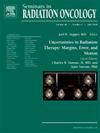Debate 3: Oligometastatic Hormone Sensitive Prostate Cancer Management: Systemic Therapy Approach
IF 3.2
3区 医学
Q3 ONCOLOGY
引用次数: 0
Abstract
Oligometastatic prostate cancer (OMPC) represents an intermediate stage between localized and extensive metastatic disease, characterized by a limited number of metastatic lesions. While metastasis-directed therapy (MDT) has gained traction for its potential to delay systemic therapy, systemic therapy itself is falling behind. In our view, this is not appropriate at the current stage. In the context of this controversy, we highlight the points that emphasize the role of systemic therapy in OMPC and point out weaknesses of data available on local treatment concepts. The lack of a standardized OMPC definition complicates the comparison of results across studies. Imaging inconsistencies, ranging from conventional techniques to advanced PSMA-PET/CT, further challenge accurate classification. Additionally, the biological basis of OMPC remains unclear, with no definitive biomarkers distinguishing it from polymetastatic disease. While MDT has demonstrated improved progression-free survival in small trials, its impact on overall survival remains inconclusive. Conversely, systemic therapy with androgen receptor pathway inhibitors (ARPIs) has shown a significant survival advantage in phase 3 trials. Subgroup analyses from large trials indicate a benefit of systemic therapy, particularly in low-volume disease. Combination strategies incorporating MDT and systemic therapy may optimize outcomes. Further research is needed to refine patient selection, integrate molecular biomarkers, and establish the optimal treatment paradigm. Until robust evidence emerges, systemic therapy remains the standard of care for OMPC.
辩论3:低转移性激素敏感性前列腺癌的管理:全身治疗方法
少转移性前列腺癌(OMPC)是介于局部转移和广泛转移之间的中间阶段,其特征是转移灶数量有限。虽然转移导向疗法(MDT)因其延迟全身治疗的潜力而获得了关注,但全身治疗本身却落后了。我们认为,这在现阶段是不合适的。在这一争议的背景下,我们强调了强调全身治疗在OMPC中的作用的观点,并指出了有关局部治疗概念的现有数据的弱点。缺乏标准化的OMPC定义使跨研究结果的比较复杂化。从传统技术到先进的PSMA-PET/CT,成像不一致进一步挑战了准确的分类。此外,OMPC的生物学基础尚不清楚,没有明确的生物标志物将其与多转移性疾病区分开来。虽然MDT在小型试验中证明了无进展生存期的改善,但其对总生存期的影响仍不确定。相反,在3期试验中,雄激素受体途径抑制剂(arpi)的全身治疗显示出显着的生存优势。来自大型试验的亚组分析表明全身治疗的益处,特别是在小容量疾病中。结合MDT和全身治疗的联合策略可以优化结果。需要进一步的研究来完善患者选择,整合分子生物标志物,并建立最佳的治疗模式。在强有力的证据出现之前,全身治疗仍然是OMPC的标准治疗。
本文章由计算机程序翻译,如有差异,请以英文原文为准。
求助全文
约1分钟内获得全文
求助全文
来源期刊
CiteScore
5.80
自引率
0.00%
发文量
48
审稿时长
>12 weeks
期刊介绍:
Each issue of Seminars in Radiation Oncology is compiled by a guest editor to address a specific topic in the specialty, presenting definitive information on areas of rapid change and development. A significant number of articles report new scientific information. Topics covered include tumor biology, diagnosis, medical and surgical management of the patient, and new technologies.

 求助内容:
求助内容: 应助结果提醒方式:
应助结果提醒方式:


